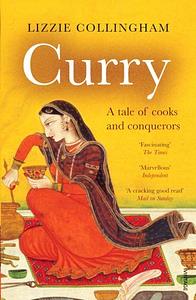Take a photo of a barcode or cover
This is food history, done really well. Collingham pieces together the iconic dish through the religious taboos and agricultural resources of ancient India, adds Middle Eastern cooking techniques from the Mughals, shows what happens when chilies arrive from Latin America via the Portuguese, Anglicizes it to the tastes of the East India Company nabobs through their house servants, imports curry powder back to Britain for said nabobs who retire, sees the dish trickle down to as cheap, filling food, tracks ethnic restaurants after WWII, including the invention of tikka masala for British tastes, and then the mass marketing of curry as fast food (and the current trend of re-discovering traditional, authentic Indian cooking).
I have had this book on my "to read" list FOREVER....and I decided to start combining and getting through or deleting stuff. Yea, boring start of a review...but I am partly proud I finally read this because I kept putting it off and now, yay! I love books about cooking, I love Indian food, I love hearing how cultures are influenced (even if against their will) and how cultures took something and made it their own.
This is the story of how colonization influenced Indian food--and created a new type of food Anglo-Indian food and also added chilis to Indian cuisine. It also described how British food (really English food) was influenced during the colonization period and how Indian food was brought to the UK. There are recipes, but I didn't touch them--- and the food sounded lovely. The writing was interesting and kept my attention even though I am not a great lover of non fiction books. It was a reminder that I should read them more--- and that I need to get myself over to India so I can try some authentic cuisine....while admiring the architecture and fabrics.
Read if you enjoy learning about different cultures/cuisines.
This is the story of how colonization influenced Indian food--and created a new type of food Anglo-Indian food and also added chilis to Indian cuisine. It also described how British food (really English food) was influenced during the colonization period and how Indian food was brought to the UK. There are recipes, but I didn't touch them--- and the food sounded lovely. The writing was interesting and kept my attention even though I am not a great lover of non fiction books. It was a reminder that I should read them more--- and that I need to get myself over to India so I can try some authentic cuisine....while admiring the architecture and fabrics.
Read if you enjoy learning about different cultures/cuisines.
Very interesting book. Only reason I'm giving 4 stars and not 5 is because it feels a little rushed and I would like to read more about different ingredients and their origins. Side note: there is a show on Netflix called 'Raja Rasoi aur Anya Kahaniyan' that also covers very similar topics so watch that if you are interested.
Loved this book. I found it informative and a lot of fun at the same time. I read this many years ago but still remember some of the factoids and a general sense of fun. That to me makes this an amazing book.
This was the first book assigned for my culinary history reading group at Motte & Bailey in Ann Arbor, MI. Really enjoyed it, learned a lot, and craved "Indian" food the entire time.
informative
medium-paced
A good read, it was exciting to have the recipes, and the history was both engaging and easily understood. Towards the end however it wandered a bit thematically, the chapter on tea seemed particularly out of place.
A solid three. Lizzie Collingham describes what has already been proven in other areas, such as language, religion, and traditions -- that South Asian cuisine is ever-evolving, influenced by so many who have come through and conquered the subcontinent over hundreds and hundreds of years. So many fascinating details - the relatively recent arrival of what are now ubiquitous Indian ingredients, such as tomatoes, onions, and chillies. One of the more interesting factoids - that the British successfully introduced tea into India only in the 1930s, within my grandparents' lifetime. Tea became a quintessential component of Indian culture only in the last century.
Lizzie Collingham went on a few tangents, but what bothered me more was that she sugarcoated the British Raj experience in India and the British back home in the UK a bit, and really didn't call them out as racists until the last chapter. I'm sure there is a darker story underneath all of this exchange of food, the treatment of "Hindoo" cooks, and farmers that this book didn't really delve into.
One interesting part of this book was the inclusion of recipes - new and old. I may try some of them. I'll likely skip the 800 year old recipe for roasted black rat - I'm sure I wouldn't do it justice.
Lizzie Collingham went on a few tangents, but what bothered me more was that she sugarcoated the British Raj experience in India and the British back home in the UK a bit, and really didn't call them out as racists until the last chapter. I'm sure there is a darker story underneath all of this exchange of food, the treatment of "Hindoo" cooks, and farmers that this book didn't really delve into.
One interesting part of this book was the inclusion of recipes - new and old. I may try some of them. I'll likely skip the 800 year old recipe for roasted black rat - I'm sure I wouldn't do it justice.
Were every history told in context of food and food culture/progression, I believe I'd know a lot more about world history. If any part of you has a love or interest in: history, India, or Indian food, you will find this an interesting and insightful read. In addition, when choosing to purchase this book, you not only receive a history as told through cuisine, but a dozen or so recipes to fit each stage of that food history.
informative
reflective
slow-paced




